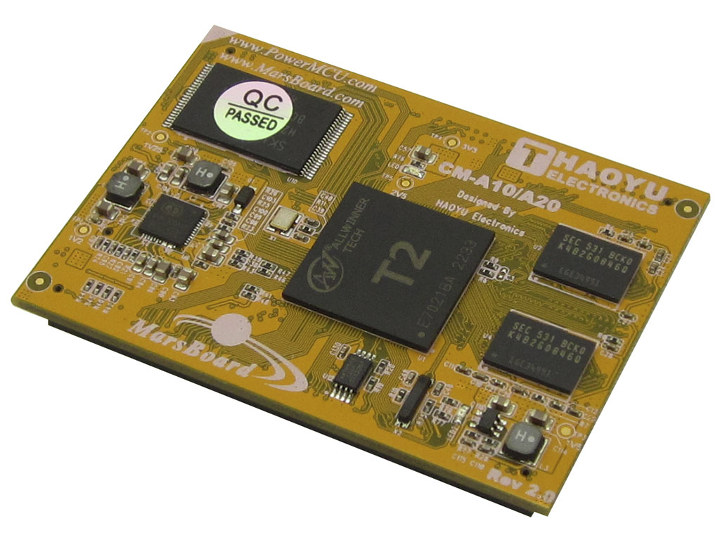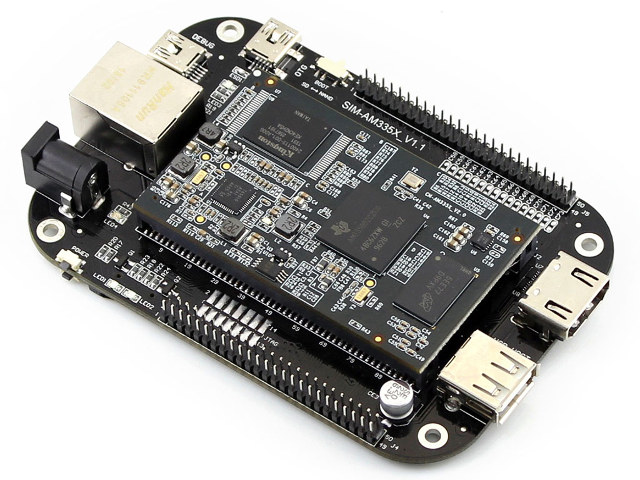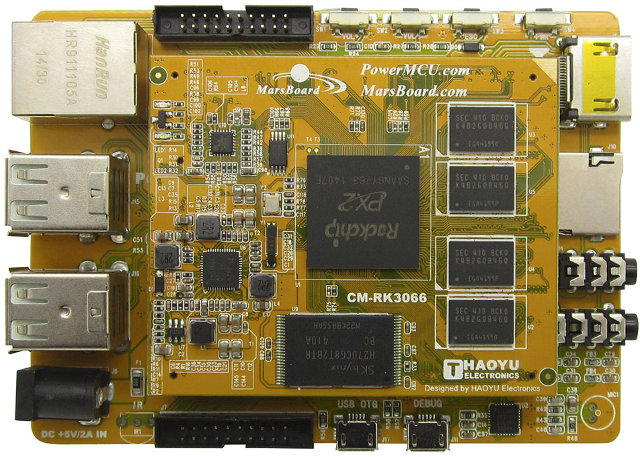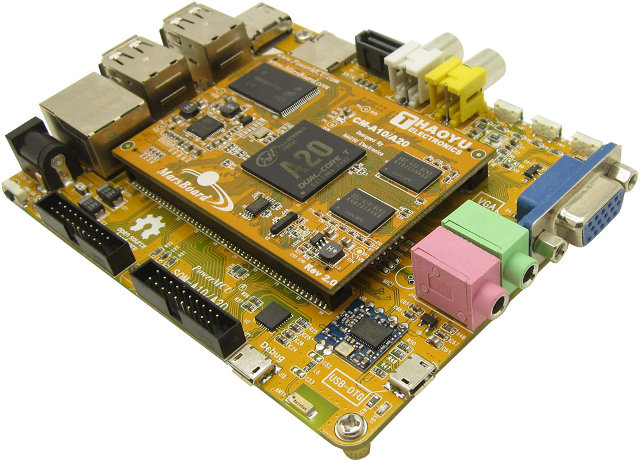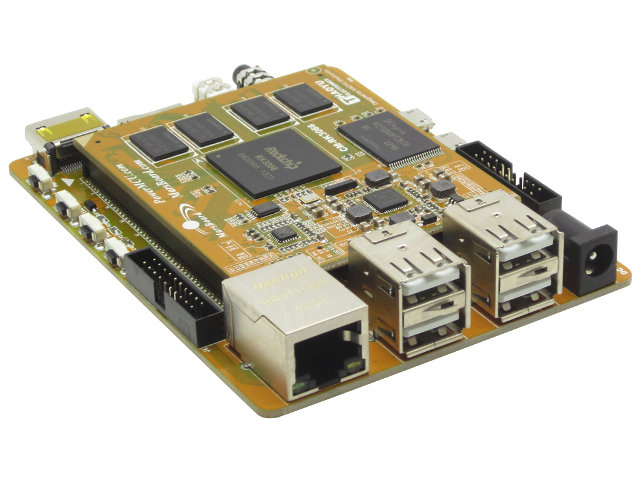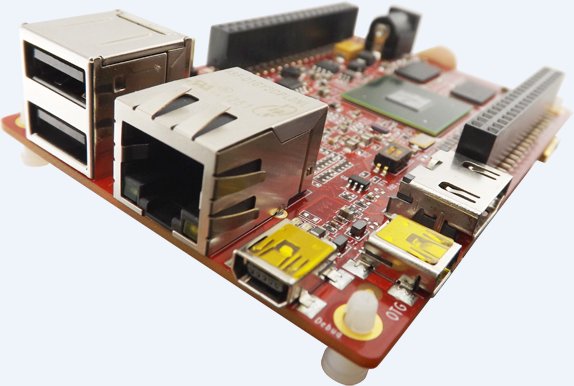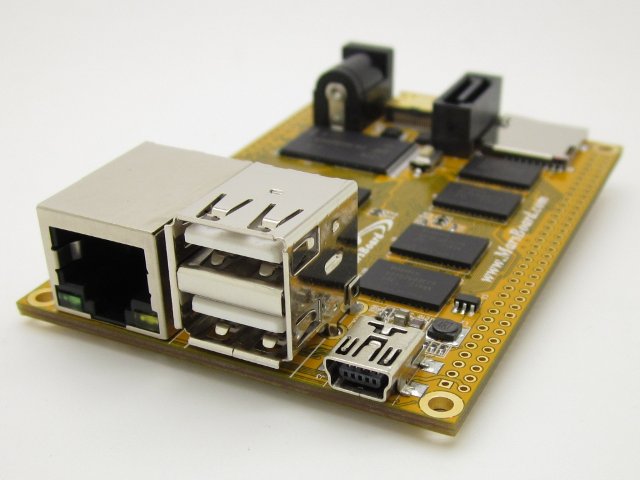Last month, Allwinner unveiled A40 and A60 industrial and military grade processors leveraging IP blocks from the old-but-popular Allwinner A20 dual core processor. This is good news for software support, as A40 and A60 should hopefully become supported in U-boot and the Linux kernel without too many efforts, as well as for companies or makers requiring wider temperature ranges in their products. However, those new processors were not pin-to-pin compatible with Allwinner A20, so a PCB redesign would be required. That’s where Allwinner T2 comes into play, as reported by Olimex, it is a rebranded Allwinner A20 dual core Cortex A7 processor with an industrial temperature range (-40 to +85 °C) that makes it suitable for automotive infotainment. I actually covered Allwinner T2 back in 2015, but at the time Allwinner did not mention anything about temperature range, and SATA support – found in A20 – was not shows in […]
Marsboard AM335X Development Board Features a TI Sitara AM335x SoM
Haoyu Electronics brought us several Allwinner and Rockchip Marsboard in the past few years, and now they’ve released a version based on Texas Instruments AM335x processor, with a form factor and features similar to the Beaglebone Black, but comprised of a baseboard and system-on-module. Marsboard AM335x board specifications: CM-AM335x System-on-module: SoC – Texas Instrument AM335x (AM3358) ARM Cortex A8 processor @ 1Ghz with SGX530 3D GPU System Memory – 512MB DDR3 SDRAM Storage – 4GB eMMC Flash Connectivity – 10/100M Ethernet PHY (LAN8710A) SoM Connectors – two 50×2 pin headers, 1.27mm pitch Misc – Power Indicator LED Power Management Unit – TPS65910 SIM-AM335X Baseboard Video Output – HDMI type A socket (via TDA19988 LCD to HDMI converter) Storage – mircro SD slot (bottom of the board) Connectivity – RJ45 connector for Fast Ethernet USB – 1x USB 2.0 Host port, 1x micro USB port Debugging – 14-pin JTAG interface (not […]
$60 MarsBoard Rockchip PX2 Development Board Runs Ubuntu, Debian, openSUSE, or Android 4.4
Haoyu Electronics has made a new board similar to their MarsBoard RK3066, but instead of using a CPU module with Rockchip RK3066, they’ve used the industrial version of the chip called Rockchip PX2 dual core Cortex A9 processor. The board is also comprised of a baseboard and CPU module (CM-PX2), and based on the name of the pictures it’s using the exact same PCB: CM-RK3066 SoM, and SOM-RK3066 baseboard, but they simply replaced RK3066 by PX2, and increased the NAND flash capacity to 8GB. CM-PX2 Computer-on-Module: SoC – Rockchip PX2 dual core ARM Cortex A9 @ 1.4 GHz + Mali-400MP4 GPU System Memory – 1GB DDR3 Storage – 8 GB NAND Power Management Unit – TPS659102 Misc – TX indicator LED use for debug, Power Indicator LED 10/100M Ethernet PHY – LAN8720A Connectors – 2x 100- pin for baseboard connection, 40-pin connector (unsoldered) Dimensions – 70 x 58 mm SOM-RK3066 […]
There’s a New MarsBoard A20 ARM Linux Development Board In Town
MarsBoard, a development board based by AllWinner A10 was released last year, soon followed by MarsBoard A20 with a dual core Cortex A7 AllWinner A20 processor. That board is now called the “Old MarsBoard A20” and is replaced by the “New MarsBoard A20” that features a baseboard + computer-on-module design, increases the NAND flash capacity to 8 GB flash, and supports 1GB RAM by default, with an option for 2 GB RAM. Let’s check the specifications of this new development board: SoC – AllWinner A20 ARM Cortex A7 dual core processor @ 1GHz + Mali-400 GPU System Memory – 1GB DDR3 @ 480 MHz by default, up to 2GB DDR3 Storage – 8GB NAND Flash, SATA II interface, and micro SD slot Video I/O HDMI up to 1080p60 VGA Composite output TV-IN (composite IN) LCD connectors for RGB and LVDS interfaces, capacitive touch support Audio I/O – HDMI, Line In/Out, Microphone […]
$60 MarsBoard RK3066 (Partially) Open Source Hardware Development Board Supports Android & PicUntu
Until now if you wanted a low cost Rockchip development board you’d have to go with Radxa Rock (Quad core RK3188) or WaxBerry Pi2 (Dual core RK3066). Thanks to Haoyu Electronics , the company who made MarsBoard A10, there’s now another option with MarsBoard RK3066 powered by Rockchip RK3066 dual core Cortex A9 SoC with 1 to 2 GB RAM, 4 to 8 GB Flash and lots of ports and expansion connectors. MarsBoard RK3066 is composed of a baseboard (SOM-RK3066) and a computer on module (CM-RK3066) with the following specifications: CM-RK3066 Computer-on-Module: SoC – Rockchip RK3066 dual core ARM Cortex A9 @ 1.6Ghz + Mali-400MP4 GPU System Memory – 1GB DDR3 SDRAM up to 2GB Storage – 4GB Nand Flash & eMMC FLASH Power Management Unit – TPS659102 Misc – TX indicator LED use for debug, Power Indicator LED 10/100M Ethernet PHY – LAN8720A SOM-RK3066 Baseboard: Storage – micro SD […]
$99 MarS Board Features Freescale i.MX6 Dual, 4GB eMMC
Embest, a subsidiary of Element14, has just announced the MarS Board, a development board powered by Freescale i.MX6 Dual (2x Cortex A9) with 1 GB RAM and 4GB eMMC flash. This is not related to the Marsboard based on AllWinner A10, and designed & manufactured by another company. Here are the key features of the MarS Board: SoC – Freescale i.MX6 Dual 2xCortex-A9 Processor @ 1GHz + Vivante GC2000 GPU. System Memory – 1GB RAM (4*256MB DDR3 SDRAM) Storage – 4GB eMMC + micro SD card slot (up to 32GByte) Video Output – 1xHDMI interface, 1x LVDS interface and 1x LCD interface USB – 4x USB Host ports (2x USB connector, 2x via headers), 1x mini USB OTG port, and 1x mini USB for debug Connectivity – 10/100M/1Gbps RJ45 Ethernet interface 2 Expansion Hearders – 2x CAN, 2x IIC, Audio & SPDIF, 8bit IPU1(Camera), SPI, USDHC1(SD card), 4x UART, 2x […]
$49.90 MarsBoard is Yet Another AllWinner A10 Development Board
After the tablet based Gooseberry and Hackberry boards, as well as Cubieboard and the upcoming A10-Olinuxino development boards, here’s another development board based on AllWinner A10 called the MarsBoard that looks very similar to the Cubieboard. Here are the key features of the board: SoC – AllWinner A10 Cortex A8 @ 1 GHz + Mali-400 GPU System Memory – 1GB DRAM Storage – 4GB Flash + 1x microSD card (up to 32GB) Video Output – HDMI Audio Output – 3.5mm stereo jack USB – 2x USB host port + 1x microUSB Connectivity – 10/100 M Ethernet SATA Connector Headers – 2x 2.0mm GPIO headers. (140 pins in total) Power Supply Requirements – 5V/2A Dimensions – 80mm x 55mm There’s also a 3.5mm jack but I’m not sure if it’s just for audio in or out, or for composite output. The website is still in construction (basically a modified copy of […]


